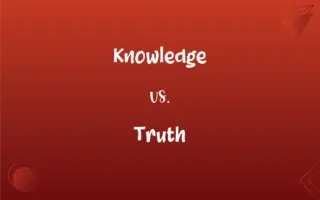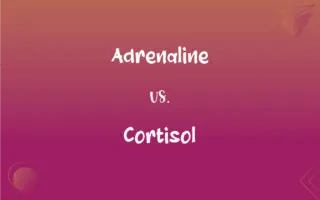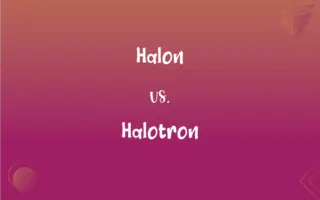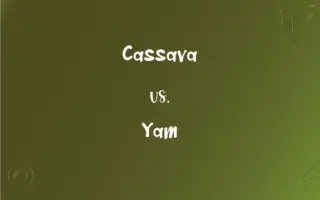Conservation vs. Preservation: What's the Difference?
Edited by Aimie Carlson || By Janet White || Published on December 16, 2023
Conservation refers to sustainable use and management of natural resources. Preservation refers to protection of resources from use or change.

Key Differences
Conservation involves the sustainable management and use of natural resources, focusing on maintaining ecological balance. In contrast, preservation aims at protecting natural resources in their original state, often prohibiting any form of exploitation or change.
The goal of conservation is to ensure the longevity and sustainable use of resources, recognizing human needs. Preservation, on the other hand, prioritizes the intrinsic value of nature, often advocating for complete protection from human interference.
Conservation strategies often include regulated use, restoration, and renewable practices, balancing ecological and human needs. Preservation emphasizes the protection of ecosystems, wildlife, and landscapes from any form of human impact, including development.
In conservation, there is an acknowledgment of the necessity for some human use and alteration of natural resources. Preservation seeks to maintain areas and resources in their untouched state, often leading to the creation of reserves and protected areas.
Conservation often requires active management to maintain the health and productivity of resources. Preservation involves a more passive approach, aiming to keep resources in their pristine condition without human intervention.
ADVERTISEMENT
Comparison Chart
Objective
Sustainable use and management of resources.
Protection of resources from any use or change.
Human Interaction
Allows regulated and sustainable human use.
Minimizes or eliminates human impact.
Approach
Involves active management and restoration.
Emphasizes protection and maintaining natural state.
Focus
Balances ecological needs with human requirements.
Focuses on the intrinsic value of nature.
Examples
Wildlife management, forest conservation.
National parks, wildlife sanctuaries.
ADVERTISEMENT
Conservation and Preservation Definitions
Conservation
The preservation of ecosystems and biodiversity.
Conservation efforts have helped restore the population of endangered species.
Preservation
The act of keeping something intact or unchanged.
The preservation of natural landscapes is a key environmental goal.
Conservation
The responsible management of resource use.
The conservation of water resources is essential in arid regions.
Preservation
The protection of something from loss or danger.
The preservation of ancient monuments is vital for historical understanding.
Conservation
Sustainable use of natural resources.
Forestry conservation ensures trees are harvested responsibly.
Preservation
Maintaining something in its original or existing state.
Wildlife preservation ensures species survive in their natural habitats.
Conservation
Protection and restoration of natural habitats.
Conservation programs include the restoration of natural habitats.
Preservation
Protecting something from decay or deterioration.
Art preservation involves preventing decay and damage to artworks.
Conservation
Prevention of wasteful use of resources.
Energy conservation reduces environmental impact.
Preservation
The process of keeping something safe from harm or destruction.
The preservation of cultural heritage is crucial for future generations.
Conservation
The act or process of conserving.
Preservation
To keep from injury, peril, or harm; protect.
Conservation
Preservation or restoration from loss, damage, or neglect
Manuscripts saved from deterioration under the program of library conservation.
FAQs
What does preservation mean?
Preservation refers to protecting natural resources from use or change.
Why is preservation important?
Preservation protects ecosystems and biodiversity in their natural state.
Does preservation allow any human use of resources?
Typically, preservation aims to minimize or eliminate human use.
How does conservation benefit the environment?
Conservation helps maintain ecological balance and sustainability.
Can conservation involve resource exploitation?
Yes, but in a regulated and sustainable manner.
What is conservation?
Conservation is the sustainable use and management of natural resources.
What are examples of conservation activities?
Examples include wildlife management and sustainable forestry.
What are common preservation efforts?
Establishing national parks and wildlife sanctuaries.
How does conservation address climate change?
Through sustainable practices and reducing resource depletion.
Can preservation lead to negative impacts?
Sometimes, if it restricts necessary ecological management.
Does preservation help in combating climate change?
Yes, by protecting natural carbon sinks like forests.
Is preservation relevant in urban areas?
Yes, in the context of historical and cultural site protection.
Can conservation efforts be locally driven?
Yes, local communities often play a key role in conservation.
Is conservation always beneficial for wildlife?
Generally, yes, as it focuses on sustainable management.
Are there conflicts between conservation and preservation?
Occasionally, due to differing approaches to human interaction with nature.
Can conservation include urban environments?
Yes, through practices like urban forestry and green building.
Are preservation efforts typically government-led?
Often, but NGOs and community groups also contribute significantly.
What is the future of conservation and preservation?
Both will continue to evolve, balancing ecological health and human needs.
Does preservation affect economic development?
It can, especially when it restricts resource use or development.
How does conservation impact economic activities?
It often leads to sustainable economic practices and resource efficiency.
About Author
Written by
Janet WhiteJanet White has been an esteemed writer and blogger for Difference Wiki. Holding a Master's degree in Science and Medical Journalism from the prestigious Boston University, she has consistently demonstrated her expertise and passion for her field. When she's not immersed in her work, Janet relishes her time exercising, delving into a good book, and cherishing moments with friends and family.
Edited by
Aimie CarlsonAimie Carlson, holding a master's degree in English literature, is a fervent English language enthusiast. She lends her writing talents to Difference Wiki, a prominent website that specializes in comparisons, offering readers insightful analyses that both captivate and inform.








































































